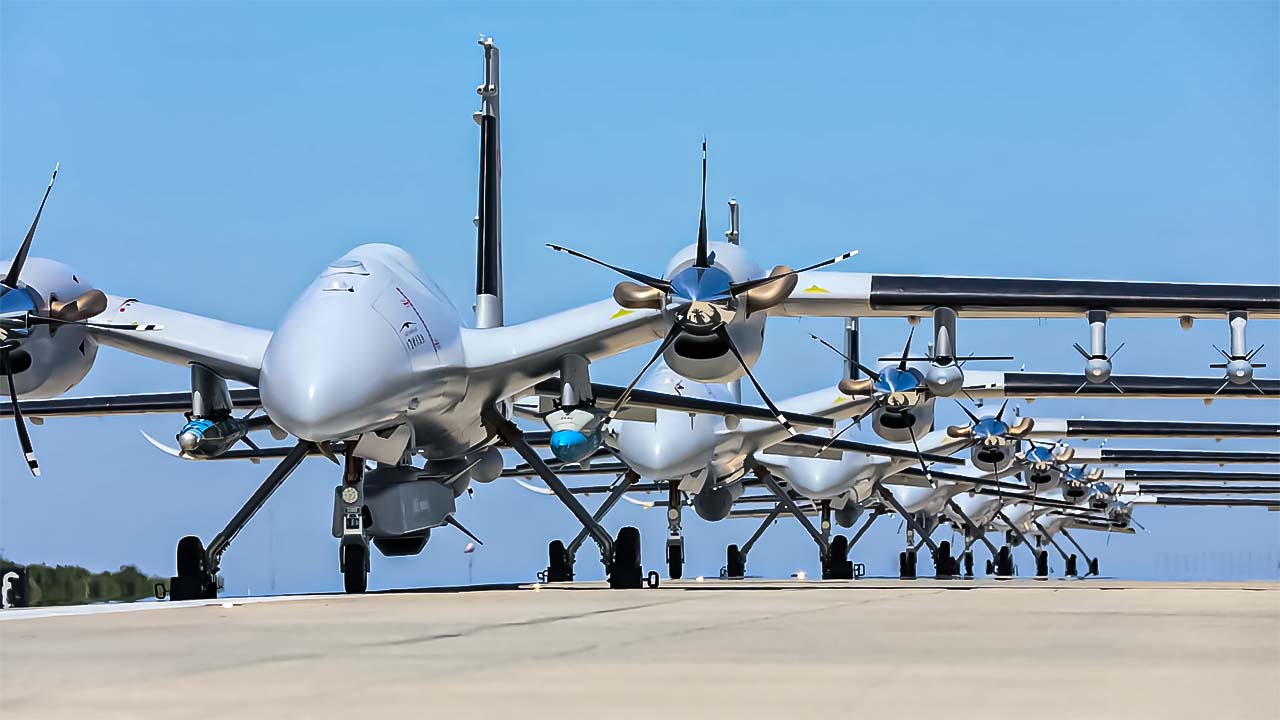Turkey is Building World’s Largest Drone Army | Bayraktar TB2
Over the past two decades, Turkey has undergone a remarkable transformation, emerging as an industrial powerhouse on the global stage. Today, its heavy industry sector stands shoulder to shoulder with the giants of Europe – France, Spain, and the United Kingdom. But Turkey’s ascent doesn’t stop at factories and manufacturing. In a surprising turn of events, it has set its sights on becoming the world’s sixth-largest exporter of weapons, putting it in direct competition with established players in the arms trade. What’s even more astonishing is that Turkey has managed to outpace Israel, known for its advanced military technology and weaponry.
One of Turkey’s standout contributions to the world of military technology is its multi-purpose military drones, with the Bayraktar TB2 at the forefront. These agile and versatile drones have made a significant impact in numerous war zones over the past few years. Their effectiveness has been demonstrated in conflicts across the globe, from the battlefields of Ukraine to the deserts of the Middle East. What sets these Turkish-made drones apart is not just their capabilities but also the fact that they are in high demand among nearly 35 countries worldwide.
The Bayraktar TB2, a cost-effective and precise unmanned aerial vehicle (UAV) designed by Selçuk Bayraktar, has gained widespread recognition for its impact in modern warfare. Since its first confirmed kill in April 2016, the TB2 has been sold to at least thirteen countries, introducing the concept of precision airstrikes to the developing world and altering the course of numerous conflicts. In the 2020 conflict between Azerbaijan and Armenia over Nagorno-Karabakh, Azerbaijan’s leader, Ilham Aliyev, effectively employed the TB2 to target enemy vehicles and troops, proudly displaying the strike footage on digital billboards in Baku.
The TB2 has conducted over 800 strikes in various conflicts, from North Africa to the Caucasus. Its ability to adjust bomb trajectories mid-flight and deliver highly accurate strikes, even into infantry trenches, has revolutionized contemporary warfare. Contrary to previous assumptions that slow, low-flying drones were ineffective in conventional combat, the TB2 has proven its capability to neutralize anti-aircraft systems designed to counter it.
Also Read: Jeddah Tower – World’s Tallest Skyscraper Resumes Construction
It was started back in 2003 when Recep Tayyip Erdogan, now Turkey’s president, assumed the role of Prime Minister. His bold announcements and unwavering determination set Turkey on this path to industrial greatness, leaving the world in awe.
Turkey has emerged as a significant player on the global military stage, and at the heart of this transformation is its remarkable prowess in the field of unmanned aerial vehicles, or drones. Today, the Turkish Armed Forces are not only the second-largest standing military force within NATO, surpassed only by the mighty U.S. Armed Forces, but they also rank 13th in the world in terms of military might. It’s important to note that Turkey’s rank is not even higher due to its lack of nuclear weapons, which it indirectly possesses through its NATO membership and the presence of U.S. nuclear bases on its territory. In essence, any military force contemplating a non-nuclear conflict in Europe would have to contend with the Turkish Armed Forces before even thinking about facing the United States.
One might find it surprising that Turkey, a predominantly Muslim country with nearly 96 percent of its 90 million residents adhering to the Islamic faith, has achieved such military prominence. What’s even more astonishing is its obsession with manufacturing its own weapons and its successful export of a wide range of modern military equipment and ammunition. From the Altai main battle tank to the Terrex infantry carrier vehicle, the Pars amphibious armored combat vehicle to the Kaplan lightweight tank, the Barbaros-class frigates to the TAI Augusta Westland T-129 ATAK all-weather attack helicopter, and the list goes on and on. Turkey’s military industrial complex has become a force to be reckoned with.
One of the standout accomplishments in Turkey’s military arsenal is its impressive fleet of drones. In fact, Turkey boasts more drones than all European nations combined, with over 200 TB2 and TB3 drones, alongside numerous other indigenous types such as the TAI Anka, TAI Anka 3, and TAI Aksungur. To put this in perspective, the UK, a major European power, has a drone fleet comprising just 10 U.S.-made Reapers that are over two decades old. Despite the TB2 and TB3 drones costing between five to eight million dollars each, they come loaded with advanced technologies and complexities that rival any in the world.
The man behind this drone revolution in Turkey is Selçuk Bayraktar. In 2005, at the age of 26, this electrical engineering graduate from Turkey’s top university embarked on a journey that would change the landscape of modern warfare. With a master’s degree from the University of Pennsylvania and an entrepreneurial spirit inherited from his family’s firm, Bayraktar Makina, which had transitioned from automobile components to unmanned aerial vehicles, Selçuk Bayraktar emerged as the Godfather of Turkey’s most advanced drones and related technologies.
Also Read: Afghanistan is Building Qosh Tepa Canal the Largest Manmade River in the Desert
Economically speaking, military drones have become a cornerstone of Turkey’s military industrial complex, contributing significantly to export revenues. In 2022, Turkey recorded a record-breaking $4.4 billion in drone exports, surpassing the entire annual defense budgets of some European countries. By the end of 2023, Turkey is projected to achieve over $7 billion from drone deals, positioning it alongside global giants like China and the United States in drone exports.
According to the Atlantic Council, Turkey is home to around 2,000 companies in the weapons manufacturing sector. Recently, Turkey secured a $4 billion deal for the manufacturing of TB2 and TB3 drones in Saudi Arabia. The country’s drone deals with numerous other nations range from tens of millions to billions of dollars, further solidifying its position as a key player in the global arms trade.
The drone that has truly propelled Turkey onto the international stage is the Bayraktar TB2. This medium altitude, long-endurance unmanned combat aerial vehicle is capable of remotely controlled or autonomous flight operations. It’s monitored and controlled from a ground control station, including weapons deployment. Remarkably, the TB2 completed over 400,000 flight hours globally by November 2021, making it the flagship of the Turkish military’s drone fleet. The TB2’s maiden flight took place in August 2014, marking the beginning of a new era in Turkish military capabilities.
Turkey has firmly established itself as a leader in drone technology, with its Bayraktar TB2 drone gaining international acclaim. The journey began on December 18, 2015, when a video was published showcasing a test firing of a missile from the Bayraktar TB2. This marked a significant milestone, showcasing Turkey’s entry into the world of combat drones. Unlike its predecessor, the TB1, which relied on imported and regulated components and technologies, the TB2 is a testament to Turkey’s self-sufficiency. Every component of the TB2 and its arsenal is proudly made in Turkey.
The Bayraktar TB2 stands out with its unique design. It features a blended-wing body design with an inverted V-tail structure. Its thrust is generated by a variable-pitch two-blade propeller in pusher configuration, mounted between the tail booms and driven by an internal combustion engine located in the body. This modular platform allows for easy customization, with detachable main components such as wings, tail booms, and V-tails. The fuselage pieces are predominantly made of lightweight carbon fiber composite with machined aluminum parts for joints. Fuel is stored within bladder tanks, and fuel consumption is precisely managed with solenoid valves.
The control center for the TB2 is equally impressive. The Ground Control Station (GCS) is based on a NATO-spec shelter unit, equipped with cross-redundant command and control systems. This ensures that the drone can be operated effectively and securely in various conditions.
The TB2 is not Turkey’s only achievement in the world of drones. Enter the Bayraktar TB3, the next-generation drone developed by Baykar. Despite ongoing conflicts, the TB3 boasts advancements over its predecessor, including short-range landing and takeoff capabilities. It was specifically designed for deployment on Turkey’s first aircraft carrier, the TCG Anadolu, which resembles Spain’s Juan Carlos aircraft carrier, making the TB3 the naval counterpart of the TB2. It is powered by an engine developed by the Turkish company Tusaş Engine Industries and comes equipped with a range of avionics, including interchangeable EO/IR/LD imaging and targeting sensor systems and multi-mode AESA radar.
But the evolution doesn’t stop there. Baykar is rapidly developing its most promising drone yet, the Kızılelma. This fighter UAV, which made its maiden flight in 2022, is set to redefine aerial warfare. With a length of 14.6 meters, a wingspan of 9.7 meters, a range of 925 kilometers, an operational altitude of over 10 kilometers, and a top speed of about 740 kilometers per hour, the Kızılelma is a formidable force. It features stealth technologies, an active electronically scanned array antenna, and autonomous takeoff and landing capabilities. Its propulsion comes from the subsonic AI 322F engine made by the Ukrainian firm Ivchenko Progress.
The Kızılelma is expected to carry a range of weapons, including precision-guided munitions, air-to-air missiles, and cruise missiles produced by Turkish manufacturers. This versatile drone represents a significant leap forward in Turkey’s military drone capabilities.
In addition to these groundbreaking drones, Turkey also boasts the TAI Akıncı and TAI Anka, exclusively designed for the Turkish Armed Forces. These drones, like their Baykar counterparts, are fast, advanced, and lethal.







